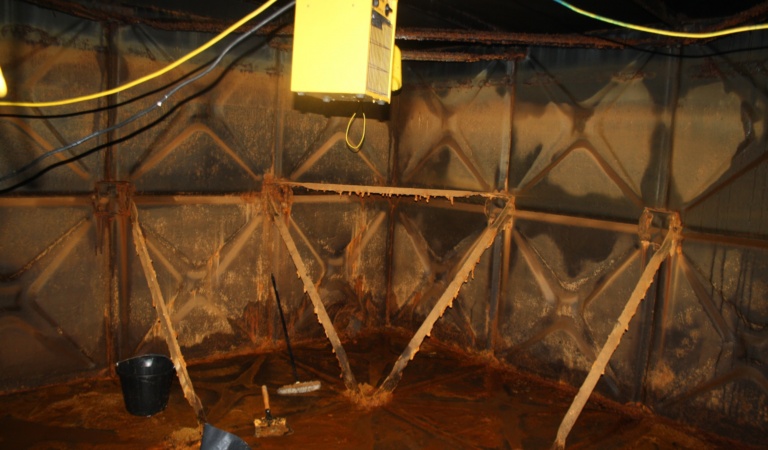 22nd April 2022
22nd April 2022Do Water Tanks Corrode?
Simply: yes.
Corrosion is a common problem in all water tanks due to heavy long term use. The structure components are prone to rust and decay.
But corrosion is a problem that can be prevented or reduced so your structure can function properly and safely for a longer time.
What Is Corrosion?
It is the deterioration of metal substances as a result of chemical reactions – like oxidation. The type of metal (plus environment) can determine the rate of deterioration.
In terms of water tanks, the metal loses electrons to the oxygen in the water. Water gaining the oxygen causes a reaction and forms an oxide with the metal material.
Corrosion is one of the most damaging naturally occurring reactions. Buildings and bridges can become unstable, bathrooms flood and pipelines break. Medical implants that are corroded could be life-threatening as they have the potential to lead to blood poisoning.
Do All Metals Corrode?
Yes. All metal material could corrode. The only difference is the rate in which they decay.
For example, a metal like pure iron will corrode quickly while nickel won’t. This is because nickel doesn’t oxidise easily so it’s resistance to corrosion is strong. Stainless steel is similar in this regard. Though it contains iron, it also has other alloys so it’s slow to corrode and, therefore, frequently used.
Types Of Corrosion
There’s different reasons for metal to corrode. Type of metal, use of metal, and environmental conditions can all be a factor.
These are the most common types of corrosion to occur regarding water tanks.
Galvanic Corrosion
When two different metals are combined, degradation can occur. This is galvanic corrosion. The transfer of charged particles from one metal to another can cause damage and corrosion to the weaker metal.
It’s important to know how galvanic corrosion occurs, especially if you are collecting rainwater. The gutter pipe metal needs to be compatible with the water tank’s metal.
Stress-Corrosion Cracks
Long-term high-pressure usage of water tanks can cause cracks to form. These cracks aren’t necessarily large, or even noticeable. They start small and, over time, corrode.
Small cracks may not seem that bad but it can lead to structural damage and instability later on.
Most steel tanks created have provisions for the pressure. At Cold Water Storage, these tanks are created with all these factors in mind.
Localised Corrosion
When we say localised corrosion, it’s in reference to only a small area of the structure where rust has formed. Typically, this occurs when the metal comes into contact with corrosion stressors.
Having a steel water tank installed on level ground, for example, is a way to reduce corrosion stress exposure.
Preventing Corrosion in Water Tanks
The most common method to control corrosion in water tanks is a protection coating.
Coating the tank wall, for example, forms a physical barrier between the tank wall and the water. So those electrons that metal loses to the oxygen in water, they can’t transfer. This slows down corrosion.
In the majority of situations, coatings perform well. But the coating should match with the design and application of the tank. If the protective barrier is broken then the coating’s efficacy will fail. Therefore, coatings should also be regularly inspected and well-maintained.
Cold Water Storage: Our Solutions
When the original coating doesn’t have a protective metal substrate, the tanks are more susceptible to corrosion. Tanks vulnerable to corrosion are also vulnerable to bacteria growth.
Especially if the water tank is storing potable water, it is crucial that tanks are up to HSE’s set standards.
We have two main solutions.
A robust and reliable coating system which is effective long-term. Our team applies a lined system that is WRAS approved once the tank has been prepared. This lining results in a galvanised steel water tank. It is protected from future bacteria growth and corrosion.
And it’s guaranteed for 10 years.
Another solution is a tank replacement. We will supply and install a GRP water tank (manufactured to British standards!).
Get In Touch
Cold Water Storage has a cumulative 30 years of experience and knowledge in the water hygiene and Legionella industry.
We install, repair, reline and replace cold water tanks.
Get in touch with our team today. Call us at 01943 872 311 or email info@coldwaterstorage.co.uk. We’re happy to help.